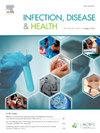The experiences and roles of infection prevention and control professionals working in residential care facilities during global outbreaks: An integrative review
IF 2
Q2 PUBLIC, ENVIRONMENTAL & OCCUPATIONAL HEALTH
引用次数: 0
Abstract
Background
The escalating threat of global infectious disease outbreaks has underscored the imperative for robust infection prevention and control (IPC) measures, particularly within the high-risk context of residential care facilities. This research aimed to investigate the experiences and roles of IPC professionals (IPCPs) in such settings during global outbreaks.
Methods
Utilising an integrative review methodology, four electronic databases – Medline, CINAHL, Embase, and Scopus – were searched from 2003 onwards for relevant papers. A two-tiered independent screening approach was employed to select eligible articles, followed by a consensus-based appraisal and thematic analysis of included studies.
Results
The final review encompassed eight articles. IPCPs faced systemic organisational and ground-level operational hurdles, including inequitable access to resources, and lack of training and outbreak preparedness. External and internal variables impacted the effectiveness of outbreak responses, affecting resident and occupational health, and perceptions of IPC over time.
Conclusions
The review identified systemic challenges IPCPs face in residential care during outbreaks, including resource inequity and lack of standardised training. Centralised resources and standardised educational benchmarks may help to mitigate these issues. Policy changes are required to enhance healthcare readiness, quality, and research in residential care settings.
在全球疫情暴发期间,在寄宿护理机构工作的感染预防和控制专业人员的经验和作用:一项综合综述
背景:全球传染病暴发的威胁不断升级,强调了采取强有力的感染预防和控制(IPC)措施的必要性,特别是在住宿护理设施的高风险环境中。这项研究旨在调查在全球疫情暴发期间,IPC专业人员在此类环境中的经验和作用。方法:采用综合综述方法,检索Medline、CINAHL、Embase和Scopus四个电子数据库,检索2003年以来的相关论文。采用两层独立筛选方法选择符合条件的文章,然后对纳入的研究进行基于共识的评估和专题分析。结果:最终综述包括8篇文章。ipcp面临着系统性的组织和基层操作障碍,包括不公平地获得资源,以及缺乏培训和疫情防范。随着时间的推移,外部和内部变量影响了疫情应对的有效性,影响了居民和职业健康,以及对IPC的看法。结论:本综述确定了暴发期间ipcp在住院护理中面临的系统性挑战,包括资源不平等和缺乏标准化培训。集中资源和标准化的教育基准可能有助于缓解这些问题。需要改变政策,以提高医疗保健准备,质量和研究的住宿护理设置。
本文章由计算机程序翻译,如有差异,请以英文原文为准。
求助全文
约1分钟内获得全文
求助全文
来源期刊

Infection Disease & Health
PUBLIC, ENVIRONMENTAL & OCCUPATIONAL HEALTH-
CiteScore
5.70
自引率
5.70%
发文量
40
审稿时长
20 days
期刊介绍:
The journal aims to be a platform for the publication and dissemination of knowledge in the area of infection and disease causing infection in humans. The journal is quarterly and publishes research, reviews, concise communications, commentary and other articles concerned with infection and disease affecting the health of an individual, organisation or population. The original and important articles in the journal investigate, report or discuss infection prevention and control; clinical, social, epidemiological or public health aspects of infectious disease; policy and planning for the control of infections; zoonoses; and vaccination related to disease in human health. Infection, Disease & Health provides a platform for the publication and dissemination of original knowledge at the nexus of the areas infection, Disease and health in a One Health context. One Health recognizes that the health of people is connected to the health of animals and the environment. One Health encourages and advances the collaborative efforts of multiple disciplines-working locally, nationally, and globally-to achieve the best health for people, animals, and our environment. This approach is fundamental because 6 out of every 10 infectious diseases in humans are zoonotic, or spread from animals. We would be expected to report or discuss infection prevention and control; clinical, social, epidemiological or public health aspects of infectious disease; policy and planning for the control of infections; zoonosis; and vaccination related to disease in human health. The Journal seeks to bring together knowledge from all specialties involved in infection research and clinical practice, and present the best work in this ever-changing field. The audience of the journal includes researchers, clinicians, health workers and public policy professionals concerned with infection, disease and health.
 求助内容:
求助内容: 应助结果提醒方式:
应助结果提醒方式:


